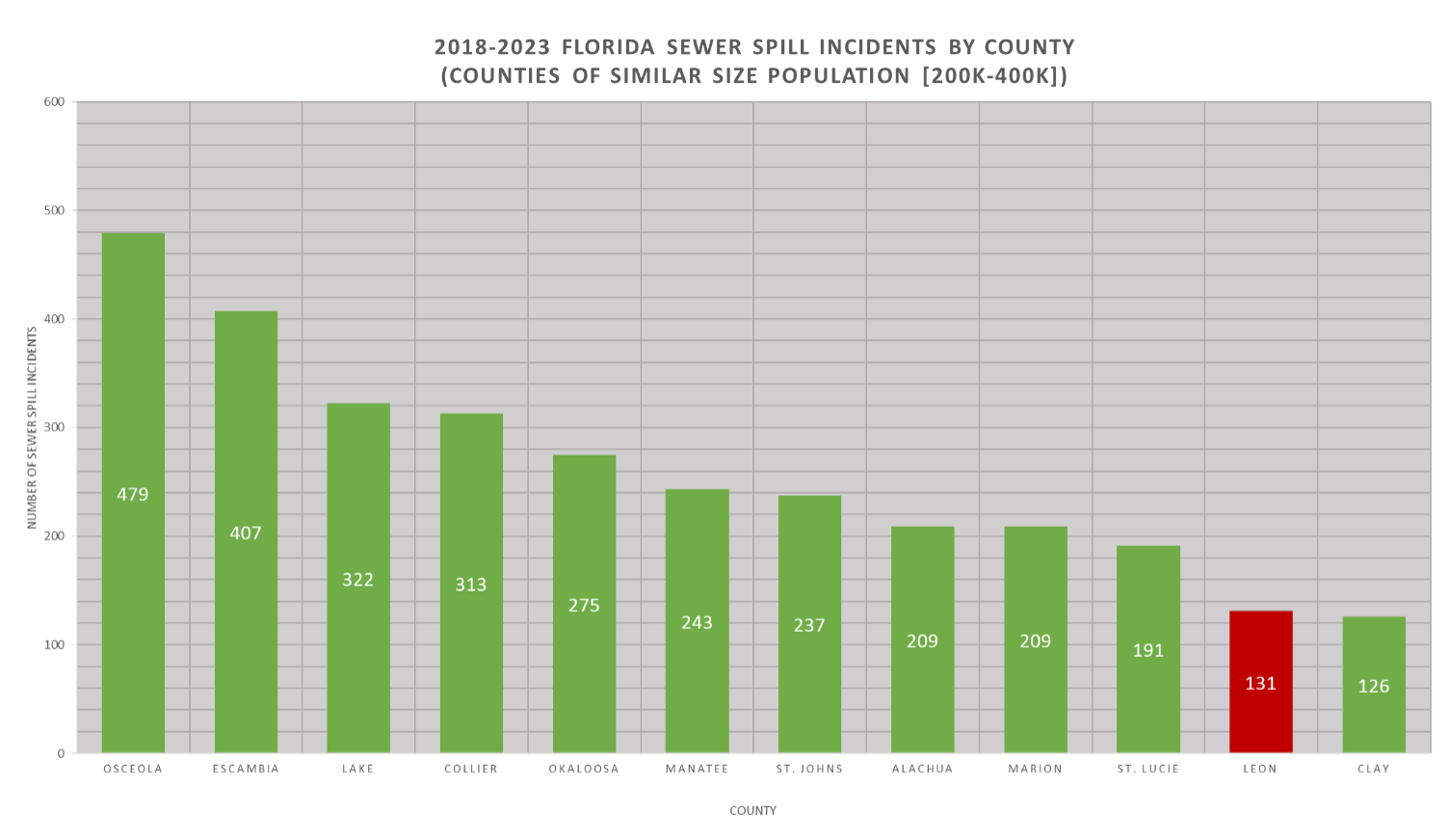A Sanitary Sewer Overflow (SSO) is any overflow, spill, release, discharge, or diversion of untreated and/or partially treated wastewater from a system. SSO’s can occur for a variety of reasons including mechanical and/or structural failures, weather events and/or loss of power just to name a few. The most common causes of SSO occurrences are blockages commonly caused by the disposal of fat, rags, oils, and grease into the sewer system.
The City of Tallahassee is a leader in proactive sewer system management and maintenance and has made significant strides in reducing overflows over the last decade. Efforts have been consistently focused on minimizing SSOs and maintaining regulatory compliance with state and federal standards, especially from the Florida Department of Environmental Protection (FDEP) and the U.S. Environmental Protection Agency (EPA).
Between 2008 through 2023, the City of Tallahassee’s innovative approach to sewer collection system management, inspection and maintenance has resulted in an 87% reduction in SSO occurrences (3-year rolling average) and a 78% reduction in spill volume (3-year total volume).

Contributing factors to Underground Utilities & Public Infrastructure Department’s positive track record in managing SSOs include addressing root causes of overflow issues and implementing solutions that keep incidents to a minimum. Additionally, ongoing infrastructure improvements, such as pipe relining, and proactive sewer system inspections using advanced monitoring and management systems have been implemented to quickly detect issues and prevent overflow situations before they occur. This proactive approach helps reduce the likelihood of SSOs caused by equipment failures, blockages, or infrastructure issues.
 *Examples of "Other" causes generally include operational, equipment problems and natural influences.
*Examples of "Other" causes generally include operational, equipment problems and natural influences.
Between 2014 and 2023, only 6% of overflows were attributed to infiltration and inflow (I&I), which is notably lower than many other cities. Infiltration is when groundwater or rainfall seeps into the sewer system. Inflow is a more direct connection of surface water or rainfall runoff into openings in the system, such as missing (or intentionally removed) manhole and cleanout covers.
The EPA Guide for Estimating Infiltration & Inflow notes that virtually every sewer system has some infiltration and/or inflow. Several methods exist for determining whether I&I is considered excessive. The EPA’s Project Certification Standards defines infiltration as excessive if the average dry weather flow (DWF) is more than 120 gallons per capita per day (gpcd). The most simplistic evaluation of excessive infiltration is that “which can cost-effectively be removed from the sewer system, based on a comparison of the cost of removal to the cost of transporting and treating the flows.” Similarly, the EPA’s benchmark for excessive inflow is 275 gallons per capita per day, a number established based on the average wet weather flow in more than 45 different sewer systems, but also takes into consideration the feasibility and cost-effectiveness of eliminating sources of inflow.
Commitment to Continuous Improvement and Compliance
The City has made significant investments in modernizing and maintaining sewer infrastructure, including regular inspections, repairs, and rehabilitation of older sewer lines and pump stations. This includes installing back-up power generators at pumpstations.
When SSOs occur, the City promptly reports the issue and takes immediate corrective action to reduce immediate and future impact. Citizens can sign up to receive notifications of overflows in Leon County here.
Reporting
- Reporting process is set by Florida DEP and initiated within 24-hours of discovery
- Notification to Florida DEP for SSOs under 1,000 gallons
- Public notice of pollution form submitted for SSOs greater than or equal to 1,000 gallons or impacting surface waters or threatens public health via the State Watch Office and Florida Department of Health
- Report provides details including spill location, date, and time of discovery and cessation; volume estimate; suspected source or cause of incident; list of impacted and notified parties; and other relevant information.
- View all Public Notices of Pollution reported in the last 30 days
Water Quality Sampling
- Florida DEP standard protocols are followed to ensure consistent, proper sampling procedures.
- Test for Escherichia coli (coli) bacteria – Applicable indicator of human waste in Class III fresh waters.
- Sample Locations include Point of Discharge, Upstream, and Downstream
- Samples are collected and analyzed daily until bacteria levels meet water quality standards (≤410 colonies/100 mL) or upstream water quality value at each sample point.
Contact Information
- City of Tallahassee: (850) 891-4968
- Florida State Watch Office: (800) 320-0519
Go back to the Wastewater Services main page.